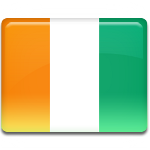Independence Day in Ivory Coast Date in the current year: August 7, 2026
 Independence Day is the national holiday of Ivory Coast. It is celebrated on August 7, commemorating the day in 1960 when the country declared its independence from France.
Independence Day is the national holiday of Ivory Coast. It is celebrated on August 7, commemorating the day in 1960 when the country declared its independence from France.Ivory Coast (officially the Republic of Cote d’Ivoire) is a country in West Africa that borders Guinea, Liberia, Burkina Faco, Mali, and Ghana. Before its colonization by Europeans, the territory of what is now the Ivory Coast was home to several states such as Gyaaman, the Kong Empire, and Baoulé.
Although Ivory Coast practiced slavery, it suffered less from the slave trade than neighboring areas because European ships preferred other areas along the coast, in what is now Senegal and Ghana. The French began to establish control over Ivory Coast in the mid-19th century, signing treaties with local kings. They established trading posts at Grand Bassam and Assine, hoping to expand trade in the future.
In 1889, Britain recognized French sovereignty in the West African coastal region. Most boundaries of Ivory Coast, except for the northern one, were formally established in 1893, and it officially became a French colony and part of French West Africa. Ivory Coast was the only French colony in West Africa that had a sizable population of settlers. As a result, French citizens owned large plantations and subjected local populations to forced labor.
During the colonial period, African residents of Ivory Coast were officially French subjects, but they had no political rights, except for a small group of Westernized elite. Ivorians were granted French citizenship after World War II, as a sign of gratitude for their loyalty during the war.
The first moves towards independence were made by Félix Houphouët-Boigny, the son of a Baoulé chief. He originally pursued a medical career, but eventually had to give it up in favor of active involvement in local politics and labor movement. He also took charge of the family plantation and became a successful farmer.
In 1944, Houphouët-Boigny established the African Agricultural Union, the first agricultural trade union in Ivory Coast that sought to bring together African farmers and protect their interests. The organization quickly received the support of plantation workers because its demands included the abolition of forced labor, higher wages, and better working conditions.
Houphouët-Boigny rose to prominence very quickly, and within a year he was elected to the National Assembly in Paris. He established a strong relationship with the French government and eventually became the first African to be appointed a minister in a European government.
Following the passing of the 1956 Overseas Reform Act, Ivory Coast became a self-governing member of the French Community. After a two-year transitional period, the country declared its independence on August 7, 1960, with Houphouët-Boigny as its first president.
As it’s already been said, Independence Day is the national day of Cote d’Ivoire. It is packed with various celebratory events and activities, including military parades and processions, cultural activities, parties, and more. The biggest celebration takes place in the capital city of Yamoussoukro. During more turbulent years, both the government and opposition use the day as a propaganda opportunity, holding political rallies in the streets.
- Category
- Public Holidays
- Country
- Ivory Coast
- Tags
- independence day in ivory coast, national holiday, public holiday, holidays in ivory coast, observances in ivory coast